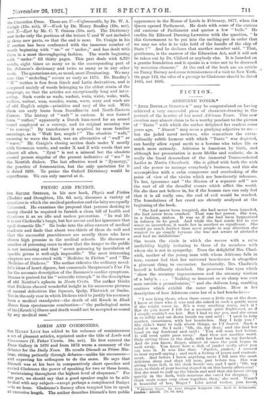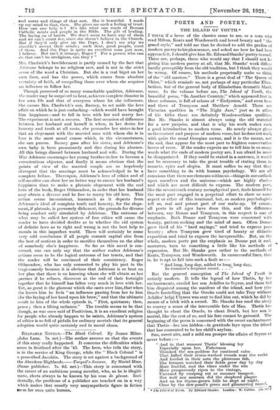FICTION.
ADRIENNE TONER.*
" ANNE DOUGLAS SEDOWICR " may bo congratulated on having achieved a very successful piece of character-drawing in the portrait of the heroine of her novel Adrienne Toner. This new creation may almost claim to be a worthy pendant to the picture of " Tante " with which the author delighted her readers some years ago. " Almost " may seem a grudging adjective to use— but the jaded novel reviewer, who remembers the extra- ordinarily subtle humour with which " Tante " was depicted, can hardly allow equal merit to a heroine who takes life so much more seriously. Adrienne is American by birth, and although her presentation is more lifelike and realistic, she is really the lineal descendant of the immortal Transcendental Ladies in Martin Chuzzlewit. She is gifted with both the wish and the power to manage everybody's business, and this she accomplishes with a calm composure and overlooking of the point of view of the victim which are beneficently inhuman. To her, ignorance and " the illusion of a separate self " am the root of all the dreadful events which afflict the world. Sin she does not believe in, for if the human race can only feel that it is all really ono, the end of evil would be reached. The foundations of her creed are cleverly analysed at the beginning of the book.
" She had never been tempted, she had never been impeded, she had never been crushed. That was her power. She was, in a fashion, sinless. It was as if she had been hypnotized in infancy to be good. And while the fact made her in one sense so savourless, it made her in another so significant. She would go much further than most people in any direction she wanted to go simply because she was not aware of obstacles and had no inhibitions."
She treats the circle in which she moves with a calm ineffability highly irritating to those of its members with whom she is not in sympathy. Even the delightful Mrs. Chad- wick, mother of the young man with whom Adrienne falls in love, cannot feel that her universal beneficence is altogether a pleasant thing to encounter. Incidentally, Mrs. Chadwick herself is brilliantly sketched. She possesses blue eyes which " show the uncanny ingenuousness and tho uncanny wisdom of a baby's. . . . ' Nothing so innocent or so sharp was ever seen outside a perambulator,' " and she delivers long, rambling orations which exhibit the same qualities. Here is her description of bow Adrienne cures her of a bad headache :— " I was lying there, when there came a little rap at the door. I know at once who it was and she asked in such a gentle voice if she might come in. It's a very soothing voice, isn't it ? But do you know I felt for a moment quite frightened, as if I simply couldn't see her. But I had to say yes, and she came in so softly and sat down beside me and said : I used to help mother, sometimes, with her headaches. May I help you ? ' She didn't want to talk about things, as I'd feared. Such a relief it was. So I said : Oh, do, my dear,' and she laid hot hand on my forehead and said : ' You will soon feel better. It will soon quite pass away.' And then not another word. Only sitting there in the dark, with her hand on my forehead. And do you know, Roger, almost at once the pain began to molt away. You know how a dish of junket melts after you cut into it. It was like that. 'Junket, junket,' I seemed to hear myself saying ; and such a feeling of peace and content- ment. And before I knew anything more I fell into the moat delicious sleep and slept till now, just before tea. She was sitting there still, in the dark beside me, and I said : ' Oh, my dear, to think of your having stayed in on this lovely afternoon? ' But she went to pull up the blinds and said that she loved sitting quietly in the dark, with someone she cared for sleeping. ' I think souls come very close together, then,' she said. Wasn't it beautiful of her, Roger ? Like astral bodies, you know, • Adrienne Toner. By Anne Douglas Bodpvick (Mrs. Basil de Sellncourt). London: Arnold. 178. dd. not.l and auras and things of that sort. Sho is beautiful. I made up my mind to that, then. She gives me such a feeling of trust. How can one help it ? It's like what one reads of Roman Catholic saints and people in the Bible. The gift, of healing. The laying on of hands. We don't seem to have any of them and we can't count her, since she doesn't believe in the Church. But if they'd only give up the Pope, I don't see why we shouldn't accept their saints ; such dear, good people, most of them. And the Popo is quite an excellent man just now, I believe. But isn't it strange, Roger ? For a person who can do that can't be irreligious, can they ? "
Mrs. Chadwick's bewilderment is partly caused by the fact that _Adrienne belongs to no religious sect, and is not in the strict sense of the word a Christian. But she is a real bigot on her own lines, and has the power, which comes from absolute certainty of faith, of compelling those over whom she acquires an influence to follow her.
Though possessed of so many remarkable qualities, Adrienne, the reader may be surprised to hear, achieves complete disaster in her own life and that of everyone whose lot she influences. She causes Mrs. Chadwick's son, Barney, to set aside the love affair on which he is just embarking—which would have brought him happiness—and to fall in love with her and marry her.
The experiment is not a success. The first occasion of difference between her husband and herself is when, in her desire for honesty and truth at all costs, she persuades her sister-in-law that an elopement with the married man with whom she is in love is the most moral course which, in the circumstances, she can pursue. Barney goes after his sister, and Adrienne's own baby is born prematurely and dies during his absence. All this brings discord between husband and wife. During the War Adrienne encourages her young brother-in-law to become a conscientious objector, and finally it seems obvious that the points of view of the married couple are so hopelessly divergent that the marriage must be acknowledged to be a complete failure. Thereupon, Adrienne's love of ethics and of self-sacrifice can show her no better way to ensure her husband's happiness than to make a platonic elopement with the real hero of the book, Roger Oldmeadow, in order that her husband in.ay obtain a divorce and be free to marry his old love. This action seems inconsistent, inasmuch as it departs from Adrienne's ideal of complete truth and honesty, for the elope- ment, if platonic, is perversely dishonest, the grounds for divorce being conduct only simulated by Adrienne. The outcome of what may be called her system of free ethics will cause the reader to have decided doubts as to whether the old system of definite laws as to right and wrong is not the best help to morals in this imperfect world. There will certainly be some very odd conclusions if all people commit capital sins from the best of motives in order to sacrifice themselves on the altar of somebody else's happiness. So far as this novel is con- cerned, one can only say that the author makes Adrienne's actions seem to be the logical outcome of her tenets, and that the reader will be convinced of their consistency. Roger Oldmeadow, who has only consented to play his part in the tragi-comedy because it is obvious that Adrienne is so bent on her plan that there is no knowing whom she will obtain as her partner if he refuses, discovers at the end of their fortnight together that he himself has fallen very much in love with her. Yet, so great is the glamour which she casts over him,that when she leaves him he feels " an influence passing from her to him like the laying of her hand upon his brow," and that the ultimate result to him of the whole episode is, " First, quietness; then, peace ; then a lifting radiance." The trouble seems to be that though, as was once said of Positivism, it is an excellent religion for people who already happen to be saints, Adrienne's system of ethics is so full of pitfalls for ordinary mortals that its general adoption would quite certainly end in moral chaos.











































 Previous page
Previous page